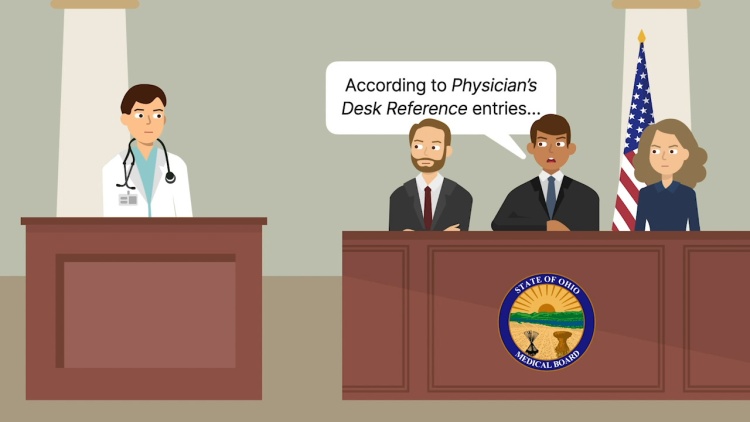In re Williams
Ohio Supreme Court
573 N.E.2d 638 (1991)
- Written by Craig Conway, LLM
Facts
Dr. Williams prescribed the controlled substances, Biphetamine or Obetrol, to 50 patients as part of a weight loss control regimen. The Ohio State Medical Board (Board) promulgated a regulation that prohibited the use of those drugs for weight control. Williams stopped prescribing when he learned of the rule. The Board (plaintiff) charged Williams (defendant) with failing to exercise reasonable care in prescribing the substances and thus, failing to conform to minimal standards of medical practice by dispensing the medications as a long-term rather than short-term treatment plan. A hearing was held and the Board introduced references recommending that the drugs be used for only a few weeks. The Board presented no testimony or other evidence regarding the appropriate standard of care. Williams presented two expert witnesses who testified that there were two schools of thought. The majority believed that the drugs should be used on a short-term basis. The minority believed that long-term use was fine. Williams’ experts testified that taking a minority view did not mean Williams’ conduct was below standard medical practice. Williams was found guilty and the Board suspended him from the practice of medicine for 1 year followed by 5 years probation with no prescription privileges. Williams appealed to the Court of Common Pleas which found that the Board’s order was not supported by substantial evidence and reversed. The court of appeals affirmed. The Board appealed to the Ohio Supreme Court.
Rule of Law
Issue
Holding and Reasoning (Brown, J.)
Dissent (Wright, J.)
What to do next…
Here's why 907,000 law students have relied on our case briefs:
- Written by law professors and practitioners, not other law students. 47,100 briefs, keyed to 996 casebooks. Top-notch customer support.
- The right amount of information, includes the facts, issues, rule of law, holding and reasoning, and any concurrences and dissents.
- Access in your classes, works on your mobile and tablet. Massive library of related video lessons and high quality multiple-choice questions.
- Easy to use, uniform format for every case brief. Written in plain English, not in legalese. Our briefs summarize and simplify; they don’t just repeat the court’s language.





